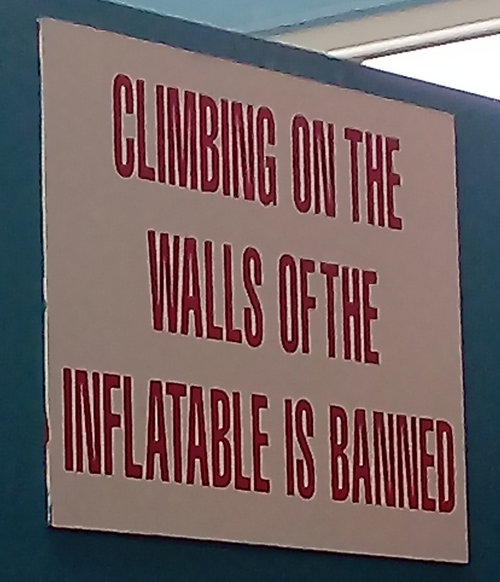I hope you find my writing and business tips and observations useful. My business and blog are dedicated to helping businesses communicate clearly and reach their potential.
Read, subscribe to my newsletter, enjoy!Tash
Who can read the sign?
We attended an indoor play centre recently for a child’s birthday party.
I spotted a sign on a wall opposite an inflatable slide, within the enclosed rock climbing area, that I think was missing the audience.
Where the sign was
The sign was up on a wall and printed in a large font so it should have been useful.
However, it was on an angle that made it hard to read except for by children rock climbing.
Surely putting it above the inflatable would have been more effective as it would be visible at the time you would be considering climbing up the forbidden walls.
What the sign said
Remembering this was in an indoor play centre where most of the patrons are under eight years of age, the sign was not written for the audience.
Apart from the very young children who can’t read at all, many youngsters would not be up to reading ‘inflatable’ and many would not know the word ‘banned’. Even for those who can understand the sign, it will be most effective if people get it instantly, without having to think about its meaning.
The inflatable is more known to children as the big slide, so that is the type of language they would be better using.
A much simpler sign would be “Do not climb up the slide”.
I think this is simpler and more effective, but also has a second meaning as it tells children not to climb up the slide itself, as well as not climbing on the support walls.
It is always important to know who you are aiming your communications at, and aim for clarity more than cleverness.
Finding hares in your bathroom
I admit the only times I have seen today’s words used incorrectly is in bathrooms or children’s writing, but is a bathroom notice less important than any other business communication?
Putting up a notice in your public bathroom as part of a policy of keeping them clean and pleasant for all users is fine and can communicate more than the words on the paper. However, a very different message can be conveyed with signs like:
Please keep your hares out of the basins
and graffiti replies such as
Then provide some rabbit hutches for us
But hairs are ok in the basins?
So for the sake of all of us using public bathrooms with hair issues, here are today’s definitions.
 hair [noun]: a long protein fibre produced by animals (mostly by mammals) from follicles in the skin. Humans consider head hair as part of our appearance whilst hair is important for warmth and survival in many other animals. Similar strands (such as on plant roots) are also called hairs.
hair [noun]: a long protein fibre produced by animals (mostly by mammals) from follicles in the skin. Humans consider head hair as part of our appearance whilst hair is important for warmth and survival in many other animals. Similar strands (such as on plant roots) are also called hairs.
Jenny brushes her hair every morning before leaving her room.
 hare [noun]: a mammal belonging to the genus Lepus, similar to rabbits
hare [noun]: a mammal belonging to the genus Lepus, similar to rabbits
The hare is related to the rabbit but does not have burrows for its young and is generally larger.
My tips for remembering which is which – hares are like rabbits while hair is in the air.
Understanding your audience
Coming along the highway back from my recent business trip, we saw a series of signs for motels and food places encouraging people to turn off into the town. In amongst these signs was one that didn’t show a lot of understanding about knowing who they are communicating with…
The fabulous Gundagai Pharmacy
All the other signs were aimed at travellers who could well need a break and/or some food so those services had the potential to attract people off the highway. But how many people doing along drive suddenly think “Oh yes, I must visit that pharmacy!”
Sure, the occasional driver will pass with a headache or other minor ailment and will want a pharmacy – even then, they will probably look for a pharmacy near something else that is worth stopping for.
I’m sure the pharmacy could have found a more effective (although perhaps less public) use of their marketing dollars. Or at least put something on their sign aimed at travellers.
This is a really simple example of how you need to understand the audience you are appealing to if you want a successful outcome. Sometimes exposure to a larger audience is tempting but a smaller, interested audience will generally bring in more clients.
Would you pull into a town because they claim to have a great pharmacy?
Exclusively present at how many places?
I recently saw a sign on the back of a bus that included “available exclusively at no other department stores”.
It left me wondering was it exclusive to the advertiser or not? It was the only department store stocking the product but it could well be available at other places which means it wasn’t exclusive at all!
Let’s look at what exclusive really means…
exclusive: entirely, not shared or including others
The reporter had an exclusive story as the witness spoke only to her.
Exclusive is an absolute term so it can’t be qualified – that is, something is exclusive or it isn’t, there is no middle option. “I’ll give you and the other TV stations an exclusive interview” and “the exclusive club is open to everyone” don’t make sense.
Check the terms first
No doubt you’ve heard it before “don’t sign anything you haven’t read” – it may sound trite but it is a valuable rule legally.
I have mentioned before that I am going to the Business Mums Conference in Melbourne this weekend, and that I submitted proposals to be a speaker. Before submitting my proposals, I read the documentation about what was expected from a speaker and what I could expect in return. I had the choice there and then to decide if any of those terms were unreasonable or disagreeable to me.
Apparently, not everyone read those documents – or maybe just didn’t take them seriously – as potential speakers sent in proposals but refused to meet one or two of the terms. And the same thing happened last year. I just don’t understand how you can agree to do something with clearly set out rules and then be surprised at having to keep those rules.
The end result is that I am speaking twice at the conference! It is not too late to get your tickets and come along – book online for the whole weekend, a day or even just my session (joking – any single session can be booked, but I would love to meet you!) And if you get back to me by COB Thursday, I have some discounted booking forms I can give you.
* I am speaking about promotional articles (of which I have written a few!) and email newsletter content.


Recent Comments